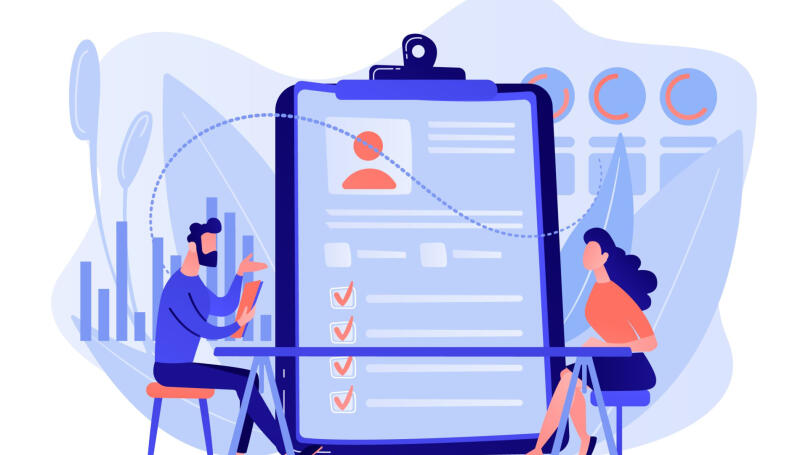Stay interview, or How to retain promising employees
It is no longer considered bad practice to switch jobs frequently. Sought-after specialists can safely quit, move to other companies, become job hoppers (that is, jump from one position to another), or freelancers.

However, such freedom and independence of employees present a serious challenge to corporate managers and HR specialists. In this article, we will analyze one of the ways to retain good employees, which is called a stay interview and is considered a preventive measure to keep promising specialists on your team.
What is the stay interview

Stay interview involves informal individual communication with an existing company employee to learn about the psychological climate in the team, working conditions, and the factors that motivate this employee to continue working with you. A stay interview is also called a hold interview. It is often compared to an exit interview, which is conducted after a professional leaves the company since the goals of both interviews are identical:
-
To understand what employees do not like about the company;
-
To learn about reasons for quitting or the likelihood that the employee will move to another job;
-
To analyze opportunities for improving working conditions;
-
To implement the necessary changes.
However, a stay interview is a much more productive and efficient method because it still provides the possibility of preventing the employee from leaving the company by eliminating the factors that contributed to this decision. That is why it is recommended to conduct regular withholding interviews. Furthermore, depending on the results of such interviews, you need to initiate changes that improve working conditions and minimize the triggers that make specialists think about leaving. In other words, the stay interview gives a chance to introduce the necessary innovations to employees even before they are disappointed in the business and want to leave it. In addition, you can learn more about managing employees and motivating them in difficult times for the company on the course "Managing during a crisis. Effective Team Communication".
Why you should conduct a stay interview

Stay interviews have been proving their effectiveness for several decades since their inception. All thanks to their advantages, which include:
-
Staff motivation
All people are pleased when they are appreciated and protected, especially if the company is struggling. Employees have to work hard to keep it afloat. However, many are highly encouraged only by the fact that the boss finds time to talk with them face to face and discuss opportunities for improving working conditions, the climate in the team, and their personal career growth.
-
Personalized approach
A stay interview involves a personal conversation with the employee; it must be tailored to each specialist, their career ambitions, desires, and achievements. In addition, you can conduct various corporate interviews among employees, for example, to determine how employees view the company's activities. However, this focuses on criteria that affect most employees, while a stay interview involves a personalized approach to each employee and a consideration of their motivations.
-
Effectiveness
Unlike the exit interview, which only reveals the problem, the stay interview involves a quick solution. That is, stay interviews aim to eliminate all factors unfavorable to employees and encourage them to look for alternative jobs.
-
Accessibility
Informal interviews do not require specialized skills and abilities. This is an inexpensive way to identify the flaws in your company - stay interviews do not require specialized skills or abilities. All they need is one hour of HR specialist or manager time and the employee's participation.
7 rules on how to conduct an effective stay interview

Regulation No. 1. Decide which employees will take part in the interview
First, stay interviews should be conducted for serious and responsible employees. After all, in the event of dismissal, replacing such employees will be the most problematic; it may involve a long search for a candidate or additional training. In addition, you should analyze the entire staff of the company. Finally, you should conduct stay interviews with key employees and employees with specialized skills. Especially pay attention to those who may leave.
Regulation No. 2. Choose an interviewer
The stay interview should be conducted directly by the head of the company or your branch, who is well acquainted with the most promising and valuable employees and knows their work area and responsibilities. However, it also happens that employees may be intimidated by their boss or afraid to speak their minds. Therefore, if your relationship with the team is not very trusting, let an HR professional handle the stay interview. Or you can take the Lectera course "The Perfect Manager. Create a Team Development Strategy" to master the techniques of team building and effective communication.
Regulation No. 3. Be prepared for unexpected changes
Take action as soon as you receive information about the company's shortcomings. There will always be a reason for justified criticism from employees, and that's why stay interviews exist. It is always important to respond immediately to criticism. This will demonstrate to the employees that the management is committed to modernization. Otherwise, why are you doing a stay interview at all? Don't do it just for show.
Regulation No. 4. Establish a supportive environment
First, the interview should be held informally, as a dialogue between company employees in different positions. A subordinate will be ready for a frank conversation only if they feel safe and comfortable. Remember that the manager needs an honest opinion. Therefore, it is necessary to create an environment where employees can speak freely, not fear the consequences of what is said, and know that their voice will be heard.
Lectera’s Online Courses by topic
Regulation No. 5. Do not deviate from the topic of conversation
The stay interview aims to determine thstaff's e level of involvement and motivation, their needs, career ambitions, and attitude to the company. Employees can divert their conversation from the topic of discussion, for example, to evaluate their manager or colleagues. The key is to be able to gently return them to the questions of the stay interview.
Regulation No. 6. Prepare your questions in advance
Stay interviews last up to an hour, but in most cases, their duration is at most 30 minutes. The number of questions may vary, so it is better to focus on their quality. Before you compose the questions themselves, decide on the goal: what exactly do you want to know? For example, what do employees think about your company, and why do they work here? Or vice versa: what shortcomings can they highlight, and what needs to be changed first? Based on the goal, formulate the questions themselves. Remember that to build communication, and it is necessary to ask open-ended questions that involve a detailed answer, not just "yes" or "no."
The following are examples of questions that may be asked during a stay interview:
-
What do you like about your job?
-
Are there factors that bother you? What?
-
Do you find your helpful work, and why?
-
What opportunities within our company do you see for your professional development?
-
What achievements in your work motivate you?
-
What would you like to change?
-
Are there any ideas on how to correct the current situation?
Regulation No. 7. Give feedback
After the interview, summarize the results. We recommend making a table and entering common answers to critical questions. These will be the main problems within the company or factors undesirable to most employees. Then, based on the results of the interviews, be sure to give feedback to your employees. For example, report that you have made adjustments to the work. Employees must know their opinions are valued, and their problems are being addressed.
Thus, the stay interview method can be a reliable strategy for retaining employees and building a trusting relationship with them. It is always important to remember that the most qualified specialists prefer to work where they are valued and respected. Such interviews are a great way to show employees how important they are and demonstrate that you are doing everything possible to provide them with growth and comfort.
Share this with your friends via:
Latest News

A significant stage in the development of the alternative education system has begun in West Northamptonshire in the UK: the County Council is actively calling on parents, guardians, and trustees to participate in shaping the future of this key area.

Outwoods Primary School in Atherstone, Warwickshire, having experienced deep sadness after the loss of their famous cat, Silla, has found solace in a new pet – a Maine Coon named Aloysius O’Hara.

In modern universities, artificial intelligence, and in particular ChatGPT, is rapidly transforming from a controversial tool into a full-fledged student assistant.

An innovative educational project is gaining momentum in UK primary schools, aiming to change attitudes towards video games.

The Massachusetts Institute of Technology (MIT) presents MIT Learn – a revolutionary online platform that opens a “new front door” to access university knowledge and resources.












 “I’m Here for the Long Haul”: When Loyalty to a Company Becomes Toxic
“I’m Here for the Long Haul”: When Loyalty to a Company Becomes Toxic
 Freelancing, Remote Work, Office Jobs, or Consulting: How to Choose the Work Format That’s Right for You
Freelancing, Remote Work, Office Jobs, or Consulting: How to Choose the Work Format That’s Right for You
 Test: How Prone Are You to Abusive Behavior as a Manager?
Test: How Prone Are You to Abusive Behavior as a Manager?
 Test. What superpower would you possess if you were a superhero?
Test. What superpower would you possess if you were a superhero?
 Test. What Should You Let Go of Before Winter Ends?
Test. What Should You Let Go of Before Winter Ends?
 Test. Which Ritual Should You Start Practicing This Winter?
Test. Which Ritual Should You Start Practicing This Winter?
